Annie MacDonald
District Nurse from the Isle of South Uist
Western Isles
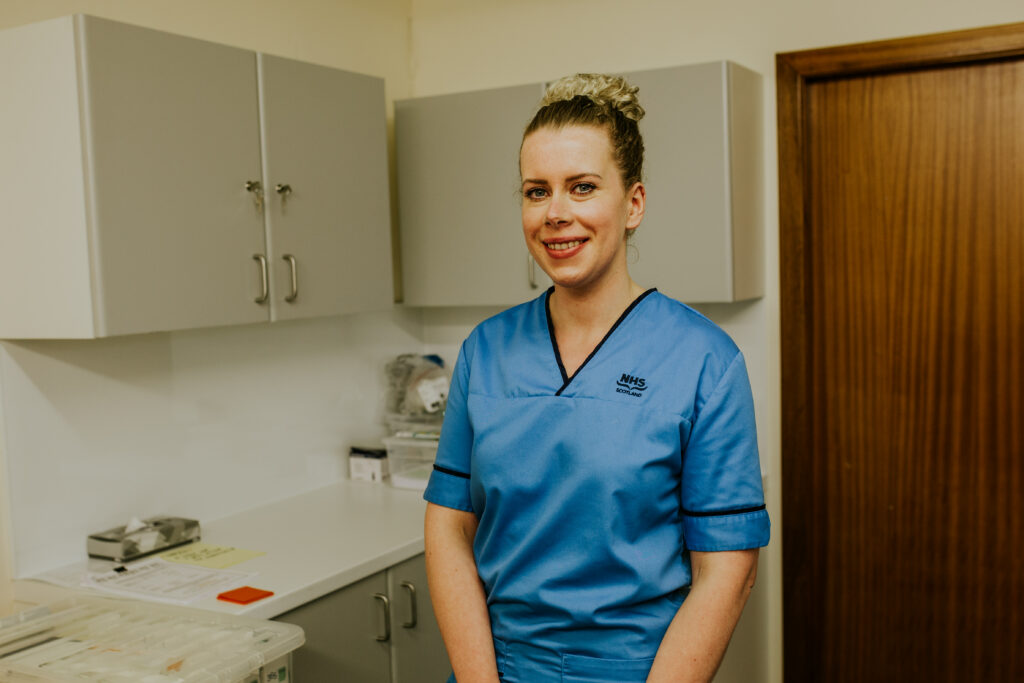
Working in the community appealed to me because I wanted to be able to look after people in their own homes. I previously worked in intensive care and thought that I would benefit from a less acute environment where I could provide a more holistic approach toward care. The dynamic is vastly different when you are a guest in someone else’s home, there is a sense that you have been invited into their space. You often meet not just the person receiving care but the whole family. Where I work in the Western Isles, I have even seen lambs and calves coming wandering in and out of the house. District nursing in people’s homes allows you the time and space to take in the bigger picture. You assess an individual while fitting into their routine. Even when someone might not feel comfortable telling you the whole story you can assess the environment and make improvements without changing too much.
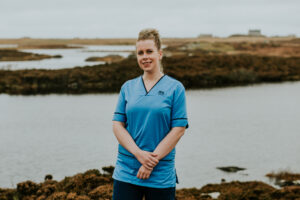 The geography of where I work means that, if at all possible, it is much easier for people to be treated at home. Although there is a hospital on Benbecula that can be a journey of over 50 miles and specialist care might even involve being flown off the island. If a hospital stay is required, people can find themselves isolated from family. My goal is to reduce the risk of hospital admissions and where unavoidable to arrange for quick and streamlined discharges. The challenges of remote and rural healthcare include linking to community services following a hospital stay. I often arrange contact with the occupational therapist or receiving remote training from the social care workers up on Stornoway. It makes sense for me, as the district nurse, to carry out these arrangements given the logistical difficulties. My day can include everything from baby immunisations to end of life care.
The geography of where I work means that, if at all possible, it is much easier for people to be treated at home. Although there is a hospital on Benbecula that can be a journey of over 50 miles and specialist care might even involve being flown off the island. If a hospital stay is required, people can find themselves isolated from family. My goal is to reduce the risk of hospital admissions and where unavoidable to arrange for quick and streamlined discharges. The challenges of remote and rural healthcare include linking to community services following a hospital stay. I often arrange contact with the occupational therapist or receiving remote training from the social care workers up on Stornoway. It makes sense for me, as the district nurse, to carry out these arrangements given the logistical difficulties. My day can include everything from baby immunisations to end of life care.
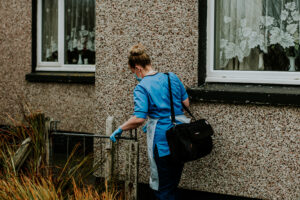 I would say that it is a unique and diverse role. You cannot fully prepare yourself for a job as a community nurse and it is not a job that finishes when you walk out the door. Even at the shop, I get called Annie the Barra nurse! It becomes a part of your identity. I like to say that it reflects the area I live in – rural, isolated, and exposed but rewarding. The natural landscape can be rugged, there might be no space for your wound pack or maybe the dog is over-friendly, but you have to get creative and make a clinical surface out of unlikely things.
I would say that it is a unique and diverse role. You cannot fully prepare yourself for a job as a community nurse and it is not a job that finishes when you walk out the door. Even at the shop, I get called Annie the Barra nurse! It becomes a part of your identity. I like to say that it reflects the area I live in – rural, isolated, and exposed but rewarding. The natural landscape can be rugged, there might be no space for your wound pack or maybe the dog is over-friendly, but you have to get creative and make a clinical surface out of unlikely things.
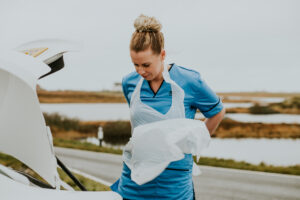 Before moving back to the Western Isles, I worked in a hospital and was used to having contact with a lot of nurses, many of them around my own age. By comparison, I can go 5 days at a time in the community without seeing another nurse. Sometimes you feel isolated like you are working in a bubble. I met so many other amazing nurses through the Queen’s Nurse programme. There were even other young nurse leaders who felt isolated like me, also in the community and facing their own challenges. The reflective conversations allowed us to get to know one another. There was an emphasis on self-care. I already do a lot of yoga and mindfulness – but the biggest thing I took away was the support network.
Before moving back to the Western Isles, I worked in a hospital and was used to having contact with a lot of nurses, many of them around my own age. By comparison, I can go 5 days at a time in the community without seeing another nurse. Sometimes you feel isolated like you are working in a bubble. I met so many other amazing nurses through the Queen’s Nurse programme. There were even other young nurse leaders who felt isolated like me, also in the community and facing their own challenges. The reflective conversations allowed us to get to know one another. There was an emphasis on self-care. I already do a lot of yoga and mindfulness – but the biggest thing I took away was the support network.
The access to coaching has been amazing. Before the Queen’s Nurse programme, I never knew it existed, but I now have a health and lifestyle coach too. It is like a kind of therapy where you do not get the answers, instead, you are taught how to find them in yourself. Coaching is a clearing of the mind, if you get your quad stuck in the mud, the coaching is that push that will get you back on the road.
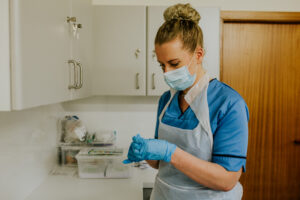 The area I work in was not hit very badly with COVID during the first wave but some of my caseload was put on hold so I could be redeployed to visit shielding patients. For my role, it has meant changes but also unexpected opportunities. Without the lockdown, some of those shielding may never have visited a GP or sought healthcare assistance. Even simple things like getting these patients a referral for cushions to support pressure relief felt like a success. There are two care homes under my caseload where I do the nursing care. I work closely with the managers of these care homes and spent a week doing a proof of concept exercise preparing them for a possible presentation of COVID. It was hard for me to watch a space turn from open and communal to closed and clinical. There was a distinct change in the patients’ mood because of the lack of socialisation so we had to work hard to avoid the strain of cognitive decline without stimulation. I think the blessing in disguise is that you do not have an off day. Nursing is a bit like therapy because you get satisfaction from looking after people, a natural buzz for playing such a special role in people’s lives. It is meaningful just to know where someone’s teabags live – sometimes that in itself is enough. I had to make a video to attract people to work here during COVID and I focussed on the landscape here. You might drive 25 miles and that sounds intense, but it gives you time to stop and reflect. It is that unwind time between cases where you can let your decision sink in against the calming backdrop of the sea.
The area I work in was not hit very badly with COVID during the first wave but some of my caseload was put on hold so I could be redeployed to visit shielding patients. For my role, it has meant changes but also unexpected opportunities. Without the lockdown, some of those shielding may never have visited a GP or sought healthcare assistance. Even simple things like getting these patients a referral for cushions to support pressure relief felt like a success. There are two care homes under my caseload where I do the nursing care. I work closely with the managers of these care homes and spent a week doing a proof of concept exercise preparing them for a possible presentation of COVID. It was hard for me to watch a space turn from open and communal to closed and clinical. There was a distinct change in the patients’ mood because of the lack of socialisation so we had to work hard to avoid the strain of cognitive decline without stimulation. I think the blessing in disguise is that you do not have an off day. Nursing is a bit like therapy because you get satisfaction from looking after people, a natural buzz for playing such a special role in people’s lives. It is meaningful just to know where someone’s teabags live – sometimes that in itself is enough. I had to make a video to attract people to work here during COVID and I focussed on the landscape here. You might drive 25 miles and that sounds intense, but it gives you time to stop and reflect. It is that unwind time between cases where you can let your decision sink in against the calming backdrop of the sea.
Since this interview, Annie has taken up a new post as an Advanced Nurse Practitioner with Benbecula Medical Practice.
